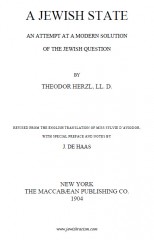
Author : Herzl Theodor
Title : A Jewish State An attempt at a morden solutiuon of the jewish question
Year : 1904
Link download : Herzl_Theodor_-_A_Jewish_State.zip
Though proportionately heretofore but little read or studied, the pages that follow this introduction will eventually occupy a noteworthy place in Jewish and universal history. Whilst the author, Dr. Theodor Herzl, was, confessedly, not moved by the novelty of the Jewish State idea, yet he was in the main unconscious in the winter of 1895 of the parentage of his thoughts; for those who had labored before him, excepting George Eliot, were comparatively obscure, and their words had only found acceptance amongst eclectic bands of enthusiasts in Eastern Europe. It is, however, curious that though argumentative, polemical or enthusiastic, none of the forerunners of the Jewish State were, in the real sense, visionaries; and this brochure is only grandiose in the simplicity of its presentation of an idea, and historic by what its publication has already achieved. Though the Jewish State idea may be Utopian, which its advocates deny, its author sketched no Utopia, and offers no picture of an ideal human future—it was sufficient for him to point out how the wounds of Israel might be healed and to remove the chafing which the conjunction of Jew and anti- Semite brings about. He offered a temporal and not a spiritual salvation to a suffering people, though those who regard him as thereby doing an allotted task towards a destiny divinely decreed, are not without reasonable justification for their opinion. The Jewish position became so critical in 1890 that Baron de Hirsch thought out his Argentine plans, and began founding his colonies, in the pampas grass districts of the Spanish American Republic, in order to aid the Jews to remove themselves from persecuted countries. The rise of Ahlwardt in Germany, the break-up of the Liberal party in Austria, and the particular success of the anti-Semitic factions in Vienna, the trial and sentence of Dreyfus in Paris, and the immediate lowering of the position of the Jews in France which followed, and for which Drumont had labored partially, the failure of the Argentine experiments—these facts, and others of lesser and greater degree will mark out the first half of the last decade of the nineteenth century as black years in Jewish history. It was seeing and hearing these things, as an observer rather than as a participant, that Theodor Herzl came to the Jewish people with an old thought, “We are a people—one people,” and an old corollary, “The restoration of the Jewish State;” unaware that, except in a vague way, there was at least fifteen years of active work, and some propaganda behind him. Fearful perhaps, of being regarded as a visionary, he vaguely designated the land of the future Jewish State simply as “over there.” And “over there” it would undoubtedly have remained had not the “Jewish State” responded to a thought, definite and concise, long pent up in Jewish bosoms. “Over there” must be Palestine. Herzl, as a cool thinker, argued that the propelling force needed to create a Jewish State exists in the misery of the Jews. The volume of that misery is unmistakable; but his book was taken up by and his following was created out of an element who, though in close touch with misery, often the actual sufferers, found within themselves a still greater motive power to national restoration than misery: to wit, love, faith and hope, a bundle of emotions wrapped in the praying shawl of the Jew; and these, when spread out, make up a flag which can only float in the breezes of Zion. This “Jewish State,” therefore, went through such violent natal sufferings as only great ideas suffer. The very fact that on this vision of a Jewish State, other visionaries wrote yet a more cloudy word: Palestine, was sufficient to condemn it in the eyes of most Western Jews. They had from the beginning of the century, in the endeavour to reconcile old Judaism with modern life, passed through several phases, sometimes concurrently, sometimes separated and distinct from each other,—spirituality, assimilation and science (Judaism is again being reduced to knowledge) in all of which the Palestinian and the one people theories were absent, obliterated and often forgotten. The Jews had become a religious community, and Judaism a religion with extensive ritual. As a Western Jew, Herzl was a freak; his book, except as the dream of an idle moment—intolerable, and as a political suggestion, unthinkable and absurd. A popular verdict was that it was an “egregious blunder,” notwithstanding which, the masses being brought into touch with the author, listened and approved. For the first time in modern history the Jewish masses—it was the first opportunity given them—began to move of their own accord. And the author of a political plan became, in a day and a night, the leader of a Jewish party, which decided to use modern methods to attain their goal—Palestine. Rabbis might proclaim every city as Zion; the rich might frown and refuse support—the modern Zionist movement “leapt full bodied into being,” and asserted its existence six months after the author had spoken face to face with the “poor and lowly,” who offered him at once their loyalty and their enthusiasm, and who, linking his profession as writer to his doctrine as Jew, regarded him as a new Ezra. Dr. David Kaufmann, in his notable criticism of “Daniel Deronda” in 1879, observed: “Feelings and sentiments which are worthy to be cherished and preserved in the nation’s soul against all the influences of time are wont to concentrate themselves in great personalities, and to impart to them a power of attraction before which moderation and halfheartedness fly like leaves before the storm. The history of Israel presents a number of such figures. Ezra and Nehemiah succeed to the Prophets of the Captivity; John of Giskala stands beside Judas Maccabaeus; Akiba ben Joseph defends the Star-Son of Bethar, and even through the darkness of the middle ages the fiery pillar of Jehudah ben Levi gleams forth. Shall we some day be able to say—‘and so on?’” The Jewish masses, whose greatness is that they have miraculously conserved an ideal, answered this question by their acclaiming Theodor Herzl as leader of the Jewish national movement. And from the moment he was so acclaimed, the Jewish State had ceased to be a paper plan; indeed, the brochure had no circulation commensurate with its effect—but it had made a page of Jewish history. Between the printed word and its objective are eight remarkable years of history; the story of the reuniting of the elements of the Diaspora; the creation of a Jewish public opinion; the organization of unwieldy and widely separated masses, largely ignorant of the methods of modern political life; political negotiations,and finally political recognition by the Great Powers of the loyalty, utility and representative character of the movement—it is the story of another Exodus with Israel still in the wilderness. ...

Palmer Michael - Hiroshima revidiert
Author : Palmer Michael Title : Hiroshima revidiert Die beweise für napalm und senfgas anstatt...














